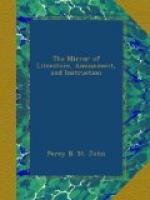The difference of character and disposition of these five families is familiar to every one; they are as well known as is the superiority of the Caucasian to the other races, and as the outward distinctions of their bodies and complexions. The reasons of this difference have been variously assigned, some ascribing it to natural, others altogether to moral causes. By natural causes we understand either that the constitutions of the races are such, that their capabilities of informing their minds, and raising their intellectual powers, are essentially not the same; or that the climate has an influence over both their bodies and minds. By moral causes, we mean artificial or accidental ones arising out of the state of society; such as the nature of the government, the plenty or poverty in which people live, a period of war or peace, the power of public opinion, and such circumstances.
The effect of climate cannot of itself be sufficient to change the manners and habits of a people. The instances of migratory nations seem to show this; the Jews are as cunning and fond of money in Asia or Africa as they are in Poland or England; that extraordinary race, the Gipsies, (which are now ascertained to be a Hindoo tribe, driven from their country in the fifteenth century,) are not less thievish in Transylvania than in Scotland. The Armenians of Constantinople, and other parts of the Levant, are represented to be of the same mild and persevering temper, of the same honesty and skilfulness in their dealings, and the same kindness and civility of manners, as before they were driven from their country by Sha-Abbas the Great. The changes, however, in the habits and character of this people seem to mark the influence of their several domestic situations. They were originally the most warlike of the Asiatic tribes; after their subjection by the Persians, they engaged themselves entirely in the patient cultivation of the soil; and since the period of the depopulation of Armenia, and their migrations into Persia, Russia, Turkey, and other countries, they have been celebrated for their industry in commercial concerns. They are bankers, money-brokers, merchants, surgeons, bakers, builders, chintz-printers, and of all trades that can be imagined, and are represented as the most useful subjects in the Ottoman empire, retaining at the same time an almost patriarchal simplicity in their domestic manners. The English in the East and West Indies, in New South Wales, and in Canada, seldom lose a relish for the habits and enjoyments they have been bred up in, whether they migrate to the extremes of heat or of cold. John Bull is an Englishman in heart, and will remain so under whatever sun his lot of life may be cast; for,
Coelum, non animum, mutant, qui trans mare currunt.
We rarely find the Spaniards or Italians, or the natives of the South of Europe, lose their ideality of character and their warm passions when settled permanently in England; the only alteration in them seems to be such as the forms of society and intercourse with others has led them to. Still the man is the same, though he may have adopted a new regime in the fashion of his clothes, or the dishes of his dinner.




